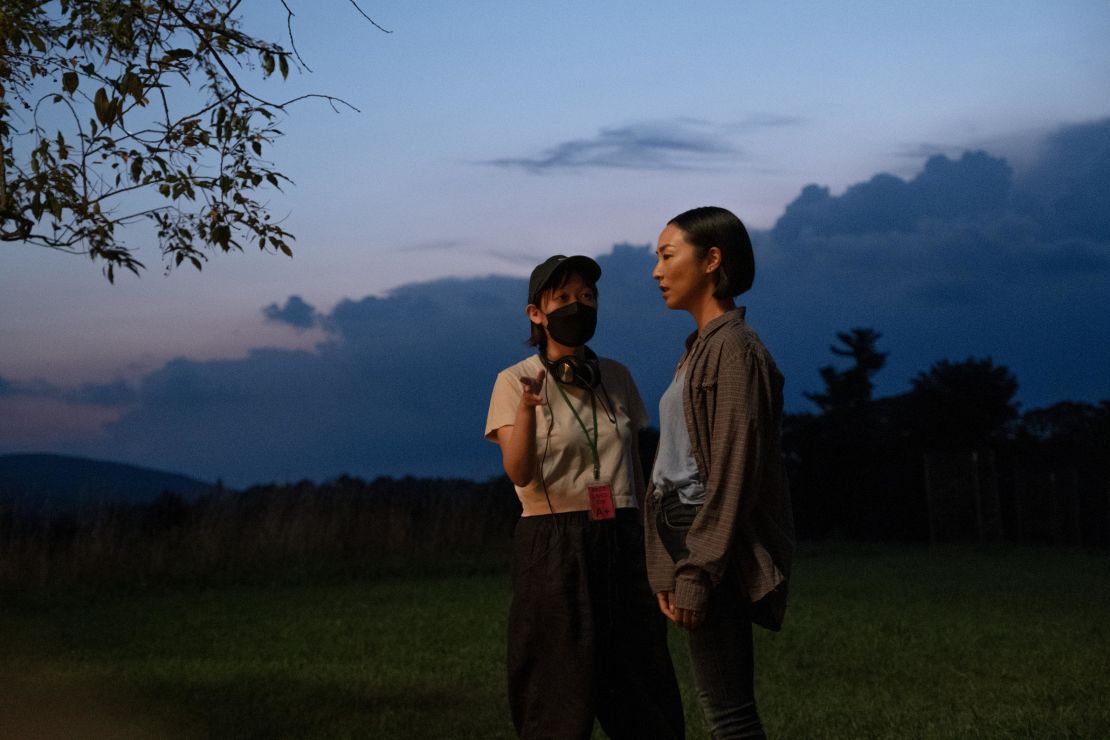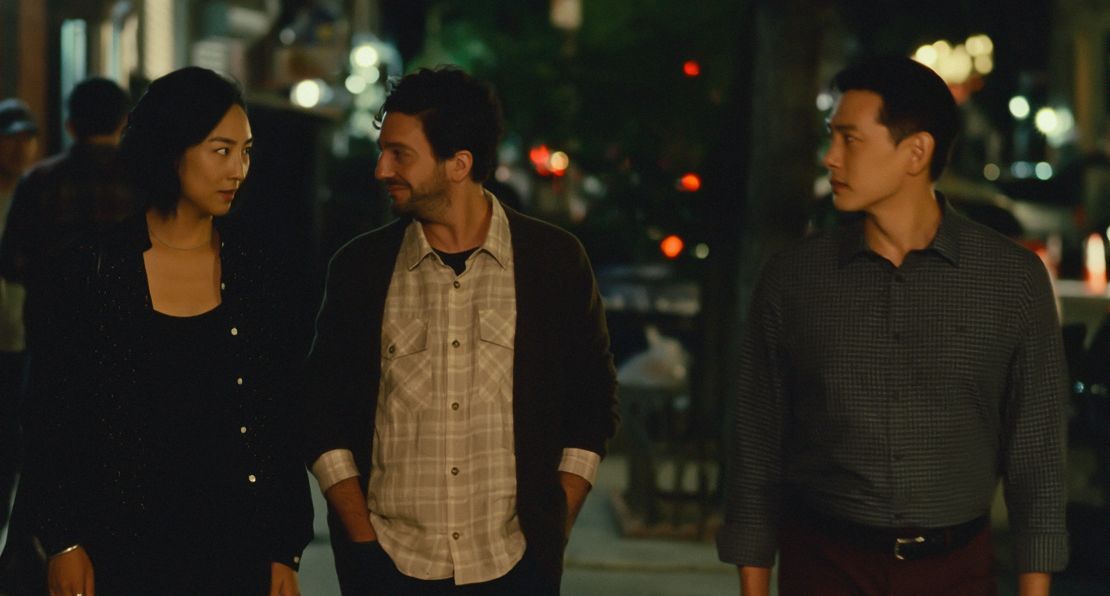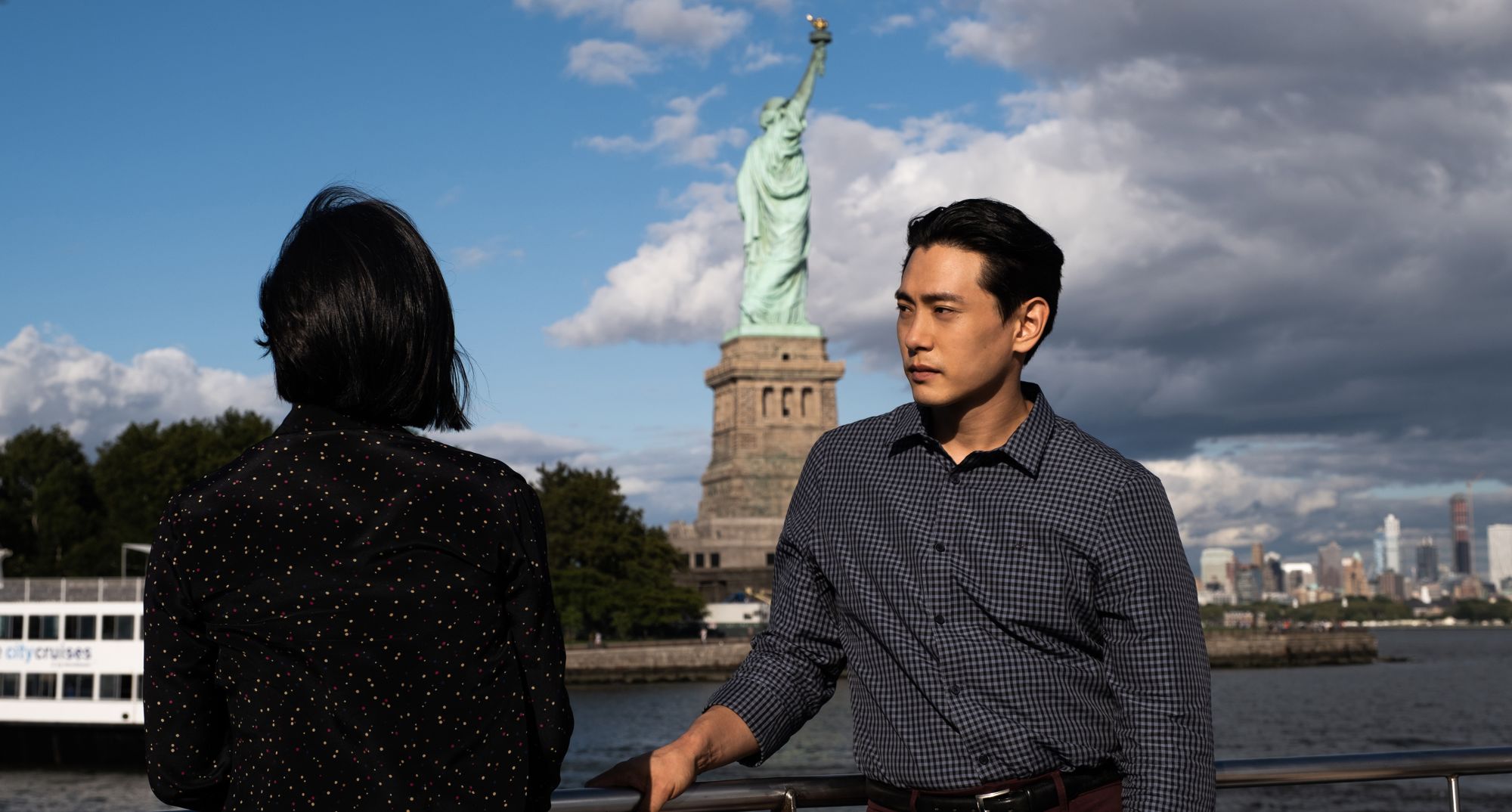Editor’s Note: This feature is part of CNN Style’s series Hyphenated, which explores the complex issue of identity among minorities in the United States.
Greta Lee isn’t afraid to mess around with her co-stars.
The actor was sitting with John Magaro and Teo Yoo for an interview about their film “Past Lives,” an achingly beautiful romantic drama about a Korean immigrant’s experiences in the US. A question about the recent flurry of Asian American stories in the spotlight felt topical.
“John, you should take this one,” Lee deadpanned. To his credit Magaro did, for an earnest, meandering minute or so, before Lee, laughing, cut in with an answer of her own.
“The idea of what makes an American movie in and of itself is changing,” she told CNN. “For quite some time now, a lot of people, myself included, have felt so strongly about questioning who gets to be the storyteller – who gets to hold the storytelling stick.”
Their film is testament to what happens when that stick is held in the right hands. “Past Lives,” by Korean Canadian writer and director Celine Song, is broadly autobiographical. It tells the story of Nora, a character who moves from Korea to Canada as a child, and later makes a life in the United States. As a thirtysomething living in New York City with her writer husband Arthur, she is visited by Hae Sung, her childhood sweetheart, causing her to contemplate what her life might have been had she not left.
The movie’s grand arc is pulled from Song’s own life, in which she, like Nora, has built a career as a playwright in New York. Before “Past Lives,” Song wrote the stage play “Endlings,” which debuted in 2019 at the American Repertory Theater in Cambridge, Massachusetts, with its subsequent New York run cut short by the Covid-19 pandemic. She has also written for Amazon’s fantasy series “The Wheel of Time.”
“Past Lives” was her first screenplay. So strong was the script, and so inextricable from Song’s own life was it, that production company A24 suggested she direct the movie, despite her having no prior experience in such a role.

Song described the screenwriting process as one of “turning the subjective into objective,” adding that she wrote “Past Lives” with an audience of one in mind: herself. “That’s always been true,” she said. “I’m going to be a harsher critic than I think most audience members, because I know my own bullshit.”
Elegantly structured in three acts spanning 24 years, we first meet 12-year-old Nora as a child in Korea, on the cusp of leaving. We then revisit her as a university student in New York, reconnecting with Hae Sung online. Just as we see the city — and the opportunities for careers and relationships it provides — nurturing Nora’s talents, we catch glimpses of Hae Sung, seemingly stagnant in her absence, performing his compulsory military service and living in Seoul, a city that appears only to isolate. Finally, we meet them, reunited, with all the baggage that comes with adulthood; its stability, but also its disappointments, big and small.
Song’s script is spare but incisive. We sense the presence of the vast tracts of life lived in between without needing to see them.
“The mystery of time and space and the way that a person lives through it is so messy,” said Song. “The goal of this movie has been for me to put clarity to it, or to be able to see those parts of what it’s like to be a person through a clearer lens.”
What if?

None of Song’s clarity would translate without the right Nora. The character needed “a burning passion, a bit of ambition (and) a lot of internal strength,” the director recalled. “I found in Greta all those things. She at one moment can feel like a full-grown woman and in the next she can feel like a little girl. That lovely contradiction in an actor is what I was looking for.”
Lee, whose previous credits include prominent supporting roles in Netflix’s “Russian Doll” and Apple TV+’s “The Morning Show,” had never led a film before. Born in Los Angeles to Korean immigrants, she said, “from the beginning, we were talking about accessing just the experience of being bicultural and bilingual, which is something that is very personal to me.”
The usual cinematic conventions of romantic drama, of a woman “still grasping for her identity or her life wants,” were ill-fitting, Lee added. “We talked about telling a story from a different place: from a woman who knows exactly what she wants, is full of ambition and is very steady.”
While undeniably romantic, the film is also a self-reflexive, subversive response to the romantic drama, in which the author allows her literary-minded characters to feel aware of the expectations of the genre – and its disjuncture with reality. “What a good story this is … I just can’t compete,” muses Arthur in one scene, discussing Nora’s reunion. “Shut up,” she replies.
Convention suggests the re-emergence of Hae Sung in Nora’s life should build towards what audiences might identify as a gut-wrenching choice: Does she stick or twist? Nora’s sense of surety is antithetical to the genre and this question. In fact, matters of the heart amount to something of a gateway for the film to contemplate a wider exploration of selfhood. Hae Sung puts a face to Nora’s life in South Korea, but what her life could have been if she and her family had stayed is a question broader than him or them.

A similar thought exercise was a key element of last year’s Oscar Best Picture winner “Everything Everywhere All At Once,” in which laundrette owner Evelyn (Michelle Yeoh) wonders what might have been had she never left China for the US. The film reveals those possibilities through the multiverse. “Past Lives” eschews such visual literalism, using its romantic totems Hae Sung and Arthur instead. In their presence, Nora finds herself straddling the Korean and North American parts of her identity. That can be confronting. Nora is shocked by how American she feels with Hae Sung, a disclosure to which Arthur poignantly adds that she only ever talks in her sleep in Korean.
It can also be cruel. Who is Nora? “You are someone who leaves,” Hae Sung says.
“This story is about a very extreme kind of leaving,” said Song, but added, “there is a part of the story that I think we can all connect to as we grow older … This movie, I think at the end of the day, is about the ways that we change as people.”
“It’s really about three adults doing their best to behave as adults,” Lee argued. Song foregoes the need for a bad guy – as Magaro’s character Arthur wryly points out, in most versions of this love story, he’d be “the evil White American husband standing in the way of destiny” – to no less affecting ends.
“You don’t need a super villain who’s about to destroy the world to feel a life-or-death stake,” said Magaro. “I think (that’s) why a lot of people are relating to this movie … And it is because our personal relationships, our marriages, our families – our need for love – are life and death for us.”
Finding connection

In “Past Lives,” the notion of “inyeon” permeates the narrative. The word defies direct translation from Korean into English, describing the ties between two people over the course of a lifetime. For Nora and Hae Sung, it fills a void describing who they are to each other: not quite friends, not lovers, not exes. They are inyeon – and there’s strength and comfort in that label as much for what it does mean as what it does not.
The reception to the movie, its empathy and its ideas, has been overwhelmingly positive since its premieres at both the Sundance and Berlin film festivals earlier this year, and its limited release in the US has earned strong box office receipts ahead of its nationwide debut in theaters on June 23.
“What people want has always been the same: for them to feel connected to art and also with each other,” said Song.
How has it felt hearing that her own story has resonated in others?
“I think it makes me feel less lonely,” said Song. “It makes me feel like I’m not the only one, in a deep way. I think with each audience member who watches the movie, I feel more connected with the world.”
That feeling might not be inyeon, but it’s not far off. And there’s comfort in that too.
“Past Lives” is released in US cinemas nationwide from Friday.

